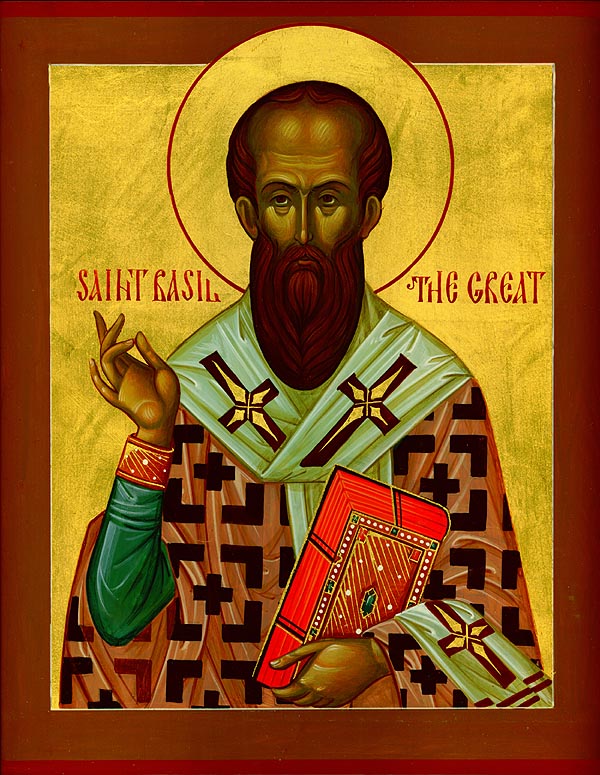 |
| Basil the Great |
Basil attained a reputation in the early church for his efforts in liturgy, monasticism, and doctrine.
The honors extended to him single him out among the greatest Christian teachers of his age: one of the “Three Holy Hierarchs” (the others are John Chrysostom and Gregory Nazianzus), one of the three “Cappadocian Fathers” (the others are his brother Gregory of Nyssa and Gregory Nazianzus), and generally referred to as Basil the Great.
Among the achievements credited to him are the Liturgy of St. Basil (commonly used in Greek Church services), the Philokalia (spiritual sayings of Origen, compiled by Basil and Gregory Nazianzus), and the Rule of Basil (the constitution followed by many Orthodox monasteries), to say nothing of his untiring efforts to unite Greek culture with the Christian Church emerging from the darkness of persecution and isolation of Semitic origins.
  |
He was born into a wealthy and devout Christian family in Pontus (modern Kayseri, Turkey) around 330 c.e. His privileged status allowed him to receive the best classical education: He sat at the feet of Libanius, a celebrated teacher of Neoplatonism in Constantinople and rubbed shoulders with the likes of Julian the Apostate.
His family, however, did not cling to their social status for they became leaders in the ascetical movement, a trend among Christians to deny themselves worldly comfort and status in order to return to spiritual priorities.
Consequently, his grandmother Macrina, his parents Basil and Emilia, his sister Macrina, and his younger brothers Gregory and Peter all are venerated as saints by Christians. Though Basil had the learning of a scholar, he chose the ascetical life.
His upbringing, the influence of an early teacher, and his pilgrimages to the Holy Land induced him to start his own community in Cappadocia. His brilliant friend Gregory Nazianzus and many others joined Basil in this life, attracted by young Basil’s zeal and spiritual reflection.
The new way of life begun by Basil was not intended for the spiritually elite or mystical individual. Rather Basil wanted it for all Christians, not just monks. The ideals included corporate and private prayer, obedience to a spiritual superior, voluntary poverty, charitable outreach, and manual labor.
In spite of its ascetical origins, community life was valued more than solitary life, and moderation, more than extreme individual exercises. These ideas became the core of the Rule of Basil, and they had a profound effect on Benedict and the Benedictines, the Latin Church counterpart to Greek monasticism.
He became bishop in 370 and so had to divide his time between monastic and more active life. He became influential among his pastoral charges for his social programs and charitable work.
For example, he built a complex of buildings to serve the sick, the poor, the pilgrims, and strangers, thus he became the champion of the common person. Even the emperor Valens, an advocate for Arianism and not Orthodox Christianity, supported Basil’s outreach to the disadvantaged of his region.
Toward the end of his life Basil became more and more absorbed in ecclesial disputes. He worked hard at building unity between the Greek and Latin Churches, as well as giving direction to theological discussions on the nature of the Trinity and the divinity of Jesus (Christ) of Nazareth. He died in 379 c.e.